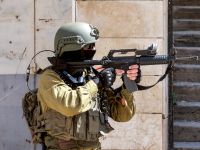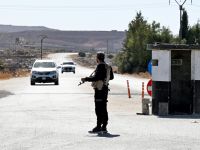U.S. Secretary of State Colin Powell held a second meeting with Israel's Prime Minister Ariel Sharon Sunday evening to report on his talks with Yasser Arafat earlier in the day.
Powell also met with Israel's President Moshe Katsav and former Prime Minister Ehud Barak to discuss the talks with the PA leader.
On Sunday afternoon, Powell said he had "useful and constructive" talks with Yasser Arafat at the Palestinian leader's Israeli-besieged headquarters.
In a terse statement after three hours of talks, Powell said he and Arafat "exchanged a variety of ideas" to be followed up when the two sides meet again Tuesday, though it was unclear if Powell would see Arafat again.
Powell said he talked with the Palestinian leader about "steps on how we can move forward," but he offered no details and he did not indicate he made any progress on attempts to gain a cease-fire.
A senior US official said Powell repeatedly insisted that "the bombings had to end," and that they were "a barrier to moving forward" in the conflict.
Arafat did not emerge from his office to speak with reporters after meeting with Powell.
"Arafat did not come out for security reasons," senior Palestinian negotiator Saeb Erekat said, gesturing toward an adjoining building held by the Israeli forces where soldiers peered out of windows. "You see the Israeli snipers all around. We are not going to take that risk."
Arafat "absolutely" pledged to curb violence, Palestinian aide Erekat told reporters who accompanied Powell to the compound. But he quickly added that the Palestinians were prepared to carry out that commitment only after a complete Israeli withdrawal from the West Bank.
"When the Israelis complete the full withdrawal we will carry out our obligations," Erekat said.
Erekat told CNN that an American and Palestinian team would meet Monday to continue talks, and that Powell and Arafat would hold a second meeting on Tuesday.
"We just completed a useful and constructive exchange...and we exchanged a variety of ideas and discussed steps on how we can move forward," Powell told reporters.
Palestinian Parliament Speaker Ahmed Quriea, who attended the meeting, told The Associated Press: "We told Secretary Powell that we shall not discuss any subject before Israel pulls out" from towns and villages occupied since March 29.
"We told him that it's time to speak about a Palestinian state along the lines" that existed before Israel occupied land seized during the 1967 Mideast war, the Palestinian official said.
Before the meeting in Ramallah, a senior aide to Arafat said the Palestinian leader was ready to cooperate fully with Powell's peace mission as long as the United States prevailed on Israel to withdraw its troops immediately from Palestinian-ruled areas of the West Bank.
Asked if he thought Powell could reach a cease-fire deal with Arafat, Nabil Abu Rdainah told Fox television: "The Israelis should withdraw immediately. That is the first step. If the Americans can guarantee this step, everything will happen smoothly later on."
Israeli Cabinet
Meanwhile, the Israeli security cabinet confirmed a plan Sunday for a plan to fortify the area along the 1967 border and allotted NIS 200 million for its implementation.
According to Haaretz, the scheme, which was formulated by the national security council in the Prime Minister's Office, is meant to make it difficult for Palestinian activists to cross into Israel.
Israel's Prime Minister Ariel Sharon issued orders for the security zone to be expanded to include more West Bank settlements - a move that will require additional funding.
(Albawaba.com)
© 2002 Al Bawaba (www.albawaba.com)









